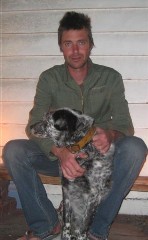Heather Taylor Johnson moved from America to Adelaide in 1999. She holds a PhD in Creative Writing from the University of Adelaide, is a poetry editor for Wet Ink magazine, and the author of the poetry collection Exit Wounds. She reviews poetry and other artforms for various publications. She has a husband, three children under six and a feisty pup, and finds the bathtub a welcome office space.
Shovelling Snow
There is subtlety in a morning snow
silent from the picture window and I’m curled cat-like
on my favourite couch, hot chocolate in my favourite mug,
warming my two morning hands, contemplating objects hidden
covered and coated with winter;
that lump that grew beneath her not yet forty skin.
Last night the phone call.
I spend the day in sweater and sweats and knitted socks
typing away at what I don’t know (death buried beneath the snow?)
because I want insight and closure
and most of the time I sit, staring at the foreign snow,
waiting to grow numb.
At three o’clock my computer rests,
a second cup of chocolate waits
while the hanging sun, timid, waits
to drop below the layered roofs
and the stewing of moose sausage waits,
the uncorking of the South Australian cab sav too
-because we wish to toast her in her own native flavour
and Canadian red wine lacks the complexity we are after.
If only I could find my couch and sit in the silence
of the late afternoon snow
but the driveway’s impatient now, covered and coated
with piles and hours of fresh white subtlety.
Christ but there is no subtlety in shovelling snow
and it does not dare to wait.
Tomorrow they will bury her in the dry, cracked
summer-drought soil, her not-yet forty years,
and as they comfort one another in their daylight despair
this house will be quiet with sleep,
not conscious of how we long for the sun.
The midnight will bring more snow and it will cover
my driveway once more, it will cover the tracks of our daily lives,
it will cover the warmth of the deep underground.
Spaces
I suggest something different from longing,
entirely separate from belonging.
I propose spaces.
Not holes or gaps
implying absence or worse
emptiness
but spaces as places
between what we know.
The big sky
my mother’s face
pizza sauce served thickly.
‘Awesome’ ‘cookie’ ‘garbage can’
my brother’s crooked eye.
SUVs and mountain streams
a bluebird’s song a hummingbird’s wing, tall glasses of 2% milk
my father’s towering body.
Vineyards
combustion heaters
saying ‘partner’ rather than ‘husband’
and sometimes stopping
to remember
he has an accent.
Port dolphins
gumtree sky
the footy the ocean
ubiquitous meat pies.
The space I am suggesting
between here and there
is not so big—
it’s enormous.
before noon
brick backyard
water bottle and phone:
or ‘my birthday poem’
The international dateline confuses calendars and friends
so yes, they all have an excuse.
Here’s to calling card expirations
and the baby’s almost due
and I didn’t get home until late last night,
and here’s to my forever forgiving simply just forgot
but you must know this:
that on this particularly sentimental day,
that here so far from the reaching Blue Ridge
I am waiting telephone on table
brick backyard.
This day is hot
like the summer tried to sneak away,
got caught red sweaty-handed
and spilled all over my body,
and on this day I wish the scent
of the ocean three kilometres away,
for my son to sleep a full two hours,
to tan myself bare
thinly layered sunscreened skin
wisteria my thick fortress.
Sweet family and those pictures of party hats
children with vague names
brown and green corduroy clothes
of the mid 70s we all seemed to wear,
remember this day
colour me into your latest photo
and stick it on the fridge.
Undomesticated university girls,
the river dudes with holey jeans,
my three-year tangle mistake
who shared my tiny bed,
our drinks were always raised to the camera’s lens,
so raise your drinks now, beyond your horizon;
it’s midnight your time
and I’m before noon water bottle ready.
I wish for the dj playing soul
to keep on spinning til the day is done
as I wish for accents like my own
because nothing speaks more of home
than an emphasized r at the end of my name,
the telephone and a strong memory
of an endlessly wooded grass backyard
and the reaching Blue Ridge in the distance.
.jpg)
.jpg)



